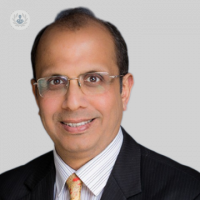What is a gastric sleeve?
Written by:A gastric sleeve, otherwise known as a sleeve gastrectomy, is a procedure carried out under general anaesthetic that reduces the size of the stomach. This causes the patient to feel fuller more quickly, meaning the size of the meals they eat will be reduced, leading to weight loss. It was originally designed to be used as an initial step in a duodenal switch procedure, but was found to be successful alone as a procedure for weight loss. Following the procedure, patients tend to lose around 50-60% of their excess weight. Award-winning consultant surgeon, and expert in weight loss surgery, Mr Sanjay Agrawal answers the questions you may have about the procedure.

How does the gastric sleeve work?
The gastric sleeve procedure involves reducing the size of the stomach by stapling off around 75-85% via a laparoscopic procedure while the patient is under general anaesthetic. The stomach is divided along its vertical length, creating a ‘banana-shaped’ stomach along the inside curve.
Following the procedure, due to the reduced stomach size, patients will only need to eat smaller meals before feeling full. This will lead to around 50-60% of excess weight being lost by the patient.
What are the advantages of having a gastric sleeve?
The gastric sleeve procedure preserves the function of the stomach by not affecting the nerves within the stomach. The rest of the gastrointestinal tract is also not affected meaning that the stomach functions as it did before, with only a change in the size.
The part of the stomach that produces the hunger hormone (ghrelin), is removed meaning levels of hunger is significantly reduced.
There is less need for follow up procedures following surgery compared to with the gastric band, as adjustments are not needed to be made.
What are the risks of a gastric sleeve?
As with any surgical procedure, the usual risks apply such as risks of unexpected reactions to general anaesthetic, excessive bleeding, staple line leakage or developing a blood clot. These risks are minimal though.
There is also a chance that the patient may experience some bruising, pain or swelling following surgery, especially around the surgical wounds. There may also be a chance of feeling sick when eating following the surgery, especially if meal sizes are not initially reduced.
How long does it take to recover from surgery?
Following the procedure, you will normally be required to stay in hospital for around two to three days. Full recovery takes around two to three weeks.
If you would like to make an appointment with a gastric sleeve specialist, click here.


